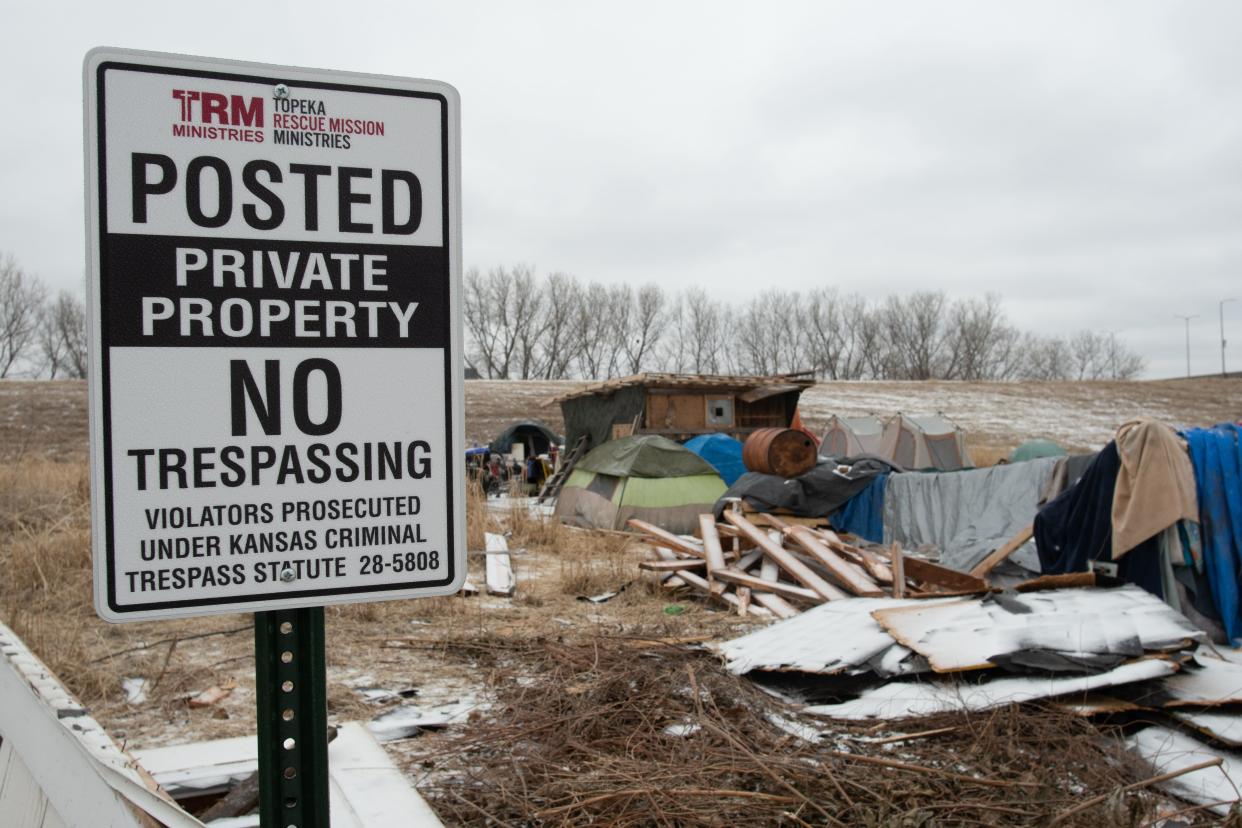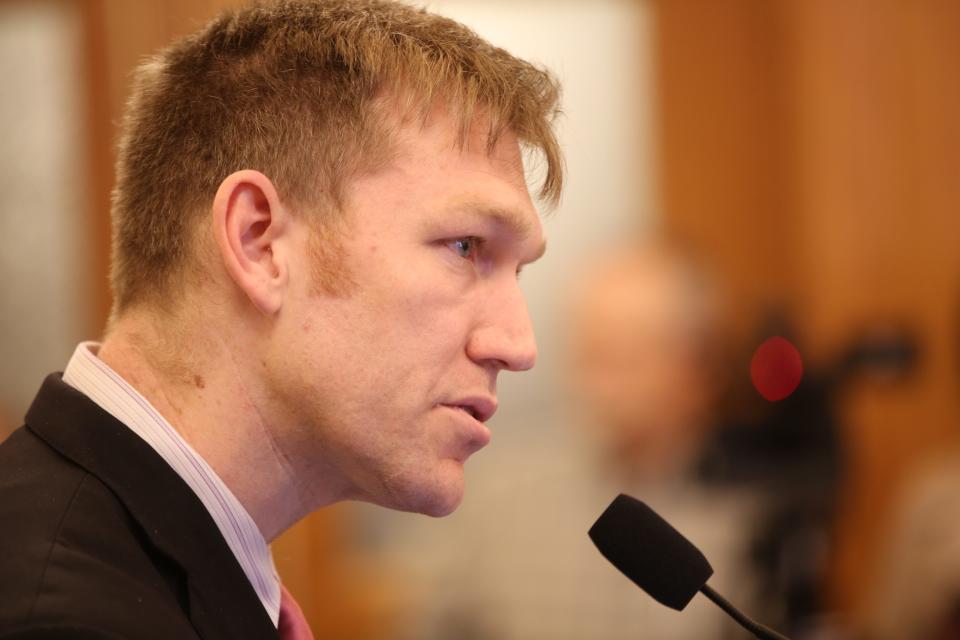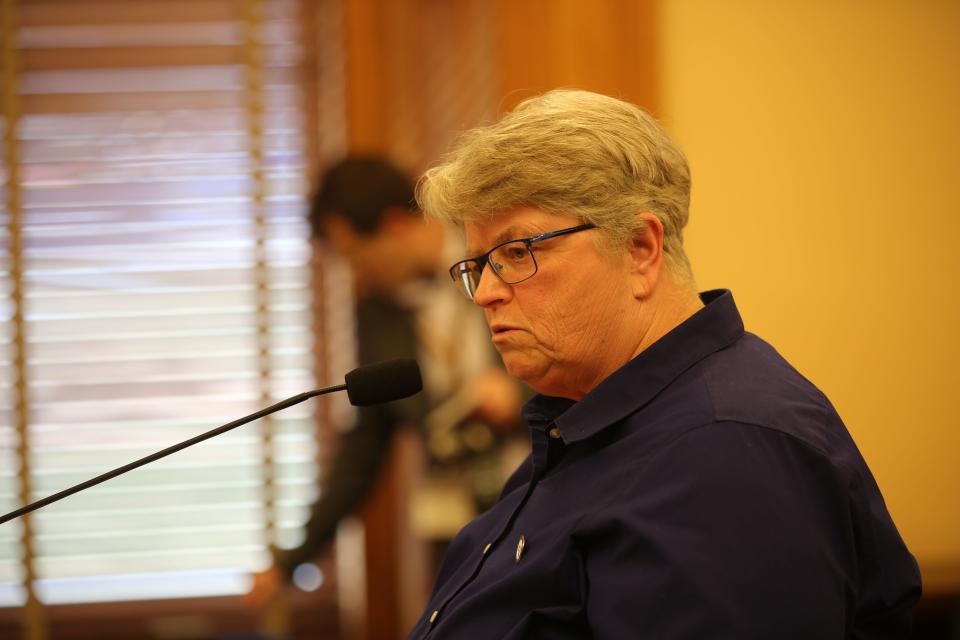Kansas lawmakers weigh ban on outdoor sleeping, camping as homeless advocates decry bill

As homelessness remains a persistent issue facing Kansas, lawmakers are considering whether to ban sleeping on state and local land, a move advocates for unsheltered individuals argue is counterproductive and criminalizes homelessness.
House Bill 2430 would also cut off state funding to combat the problem for local governments who have higher-than-average homelessness rates, a move that could threaten dollars for many cities across the state, including Topeka.
Proponents argue the move is a way of pushing more people to shelters and substance abuse and mental health treatment, though advocates note those resources already exist and are stretched thin.
"At the end of the day, you have to weigh the compassion for people in that situation versus the community that is being affected by the other side of that equation as well," said Rep. Brian Bergkamp, R-Wichita, who requested the bill on behalf of a Texas-based think tank.
There is little doubt that homelessness is a major issue in Kansas.
In Topeka, for instance, an annual count showed 412 individuals experiencing homelessness in the city, an uptick of 47 compared with 2022; in Wichita the city has seen an 11.5% in its homeless population since 2020. And it isn't just an urban problem, with advocates estimating nearly 1,000 Kansans in rural areas are homeless on a given night.
More:Point in Time count shows 412 people are unsheltered in Topeka, a jump of 47 from 2022
But critics say the better course of action is to steer more resources towards affordable housing and other programming to help individuals in need.
"This bill does perpetuate harmful stereotypes about people experiencing homelessness," Rachel Erpelding, director of Kim Wilson Housing in Wyandotte County, said. "It communicates that everyone experiencing homelessness are dangerous … These people are more likely to be victimized than violent."
Kansas bill mirrors Missouri law banning camping on public land
The Kansas bill mirrors ones introduced in a half-dozen other states and resembles large portions of model language promoted by the Cicero Institute, a Texas-based conservative think tank.
A similar law in Missouri took effect earlier this year, amid concerns from advocates that the measure would strain housing services and be used as a pre-tense to tear down homeless encampments.

Judge Glock, a representative of the Cicero Institute, was the lone individual to testify in support of the measure before the House Welfare Reform Committee.
Glock pointed to other states that have embarked on what he called "tough love" approaches of enforcing local codes but also offering government-supported outreach, something many Kansas area already do.
"Allowing people in mental health and substance abuse crisis to camp out in public is dangerous for the homeless themselves and dangerous for the cities in which they live," Glock said. "This bill would ensure cities have a compassionate, humane enforcement and ensure they get people into better situations while minimizing the possibility of criminalization or arrest."
The bill would make any sleeping or camping or state or local lands a non-person misdemeanor with a $1 fine, unless a local ordinance already allows the practice. Subsequent offenses would be more serious misdemeanors.
Such crimes would generally be handled at the municipal court level, a fact that Rep. Timothy Johnson, R-Bonner Springs, an opponent of the bill, said would make it "unenforceable."
In Lawrence local officials changed ordinances to allow camping on city land if local shelters were full. The community has debated a homeless camp in northern Lawrence, which has been city supported.

In 2019, local officials voted to make camping in some parts of Topeka illegal, while continuing to allow it in others. That hasn't stopped camps in the city, most notably Tent City in north Topeka, from being cleared in recent years.
More:North Topeka's Tent City and the complicated issue of living unhoused: 'This is our life'
Criminalizing camping, opponents say, would be counterproductive to getting individuals off the streets and into housing.
"Interactions with law enforcement can be traumatic and erode the most important capital in ending someone’s homelessness: trust the system can and will help them," Cole Schnieders, a housing navigator for United Way Plains, said.
Bill could threaten funding to fight homelessness
The legislation would also prevent law enforcement and prosecutors from choosing not to enforce local ordinances "prohibiting public camping, sleeping or obstruction of public right-of-ways."
It would allow the attorney general to bring a civil action against violators. Glock acknowledged that he was unaware of any situation where Kansas municipalities were not enforcing ordinances currently on the books but said the idea was a "prophylactic" measure.
"If a municipality really objected to this … it would be possible for the city of Lawrence to change their local ordinance to say public camping, wherever you want to do it, we don’t care," Rep. Paul Waggoner, R-Hutchinson, said.
More:Topeka's homelessness problem reaching an 'all-time crisis.' Here's how we got there.
The bill language would also potentially strip cities of state funds to combat homelessness, provided the city has a higher-than-average rate of homelessness.
At least two agencies — the Kansas Department of Aging and Disability Services and the Kansas Housing Resources Corporation — provide state grants on housing, mental health and substance use issues stemming from homelessness.
Amanda Stanley, Topeka's city attorney, said there were concerns about this idea given that the city has spent significant time and money to enforce its ordinances regarding homelessness.
"If they think we have too many unsheltered -- what is the standard?" she said. "We would hate for state funding to be held up. We would suggest investing in a city like ours that is actively trying to get all of the stakeholders at the table to find new solutions so we don't become the Los Angeles. I don't think anyone wants that."
Advocates said local and state government actors should focus on a strategy dubbed housing first, where connecting individuals experiencing homelessness with permanent housing should be the first priority without preconditions.
"Housing is the solution to ending homelessness," Rob Santel, director of housing solutions for Cross-Lines Community Outreach in Kansas City, Kan., said.
This article originally appeared on Topeka Capital-Journal: Kansas homeless advocates decry sleeping, camping ban for public land

